 Clinic Dermatech Skin care Clinic Delhi
Clinic Dermatech Skin care Clinic DelhiSkin care plays a central role in keeping rosacea under control. Many skin care products are too harsh for the sensitive skin of rosacea. Such products can cause inflammation and irritation, which can aggravate rosacea — and even cause rosacea to progress. When gentle skin care is combined with rosacea treatment and trigger avoidance, people often find that they can keep their rosacea from flaring
The Patient’s Guide to Rosacea
The Patient's Guide is the most respected online publication providing information about this skin condition, its symptoms, as well as its management and Skin treatment. Our mission is to provide our readers and skin treatment with unbiased, scientifically accurate information. The information published on our website is written and edited by some of indians foremost dermatologists and skin care experts. Information provided by individuals on this website should be considered opinion and cannot replace the advice of and consultation with a physician, but can be educational and increase awareness of this troubling but highly manageable condition
Some people who have medical problems do not like the idea of seeking treatment. This is especially true if the condition – while have dramatic effects – does not actually threaten the life of the person with the condition. Rosacea is a skin condition that meets this definition. The problems caused by rosacea can lead to terrible self confidence issues, especially for younger folks who find themselves dealing with rosacea in their developing years in front of their peers at school, but it’s not going to put anyone in the hospital, and no matter how severe it gets, it does not lead to death.
Men tend to be more reluctant to go to a doctor than women, generally speaking. For rosacea, this makes for an interesting twist because by and large women are effect in far, far greater numbers than men. However, most people do not even know what rosacea is yet I bet they can recall a man they’ve seen with it, even if they didn’t know it was rosacea! The stereotype of the old cranky man with a red, bulb-like nose is actually related to the real life skin condition known as Rhinophyma Rosacea. It’s more common in men than in women, and when left untreated, it can lead to tissue buildup around the nose, accompanied with a red appearance, thus creating the stereotype of the old man with a bulb nose.
Is this what happens without rosacea treatment? Yes, absolutely, this is what can happen if treatment is not done. Now the case of a person with a grossly shaped nose caused by rosacea is rare, and occurs when treatment has been delayed or non existent for many years, if not the lifetime of the person.
Perhaps you have been dealing with rosacea for some time or you have just been diagnosed. Either way, you must find a way to control your symptoms, not just the uncomfortable symptoms such as the itching and burning sensations, but also the facial redness and inflammation that comes with it.
Why Do I Get Body Acne?
Body acne can cause anyone who suffers from it to feel self conscious at the beach, the gym etc. Body Acne affects both men and women. Many people with facial acne also suffer from body acne, but body acne can also appear in adulthood without affecting the face.

Regular acne (acne vulgaris) usually affects the face during puberty, but during adulthood, can also affect other parts of the body such as back, chest and arms. Acne is an inflammation of the skin, caused by changes in the skin structures of the hair follicle and its associated sebaceous gland. Acne is considered an abnormal response to normal levels of the male hormone testosterone.
Secreted oils from the sebaceous glands combine with naturally occurring dead skin cells and block the hair follicles, providing a perfect environment for the skin bacteria Propionibacterium acnes to multiply uncontrollably. As a result, the affected skin area becomes inflamed, producing the visible acne lesion.
Psoriasis is a chronic disease which affects skins and joints by causing red patches to appear on the skin. Treating your psoriasis is crucial for controlling the contrition and reducing unpleasant symptoms. There are many ways to treat psoriasis, depending on how the person reacts to the specific treatment and the severity of the disease. These treatments include the use of phototherapy in which the skin is exposed to UV radiation. Medications taken in a form of pills or injection are another option. The most widely used treatment for psoriasis includes creams and ointments. Recent developments in research have led to innovative creams based on natural materials that have proved to significantly reduce psoriasis symptoms, mainly the red patches that appear on the skin
Vitiligo
Vitiligo (vit-ill-EYE-go) is a pigmentation disorder in which melanocytes (the cells that make pigment) in the skin, the mucous membranes (tissues that line the inside of the mouth and nose and genital and rectal areas), and the retina (inner layer of the eyeball) are destroyed. As a result, white patches of skin appear on different parts of the body. The hair that grows in areas affected by Vitiligo usually turns white. There is no oil, herb, vitamin or moisturizer that has any proven beneficial result for Vitiligo. The closest natural "remedy" is celery as it contains psoralens that increase the skin's natural reaction to sunlight.
How to Beat Psoriasis!
What is psoriasis? What causes psoriasis? Is there a cure or treatment for psoriasis? How do you beat psoriasis? Psoriasis is a skin condition, it is a disease, but it is not contagious. The name comes from the Greek word for "itch." It can be hereditary, caused by external influences (allergic reaction to foods or the environment) and sometimes stress. 4-5% of the population are known to be affected, and this number is growing. However, it is suspected that 1 in 5 people have some form of psoriasis either descript or non descript. Once you have psoriasis, it is very likely you will have it for ever. It may go away, and come back. It might respond to various treatments, and it may not. Basically psoriasis is your body over producing skin cells. You have too many skin cells in one location which is why it often swells up, becomes dry and even flaky. It can often be very itchy, red, sore, cracked and very tender. Psoriasis usually effects the scalp, hands, stomach, knees, feet and elbows. It is linked to dandruff and unfortunately to some forms of arthritis.
A leading psoriasis foundation has this to say about Phototherapy treatment for psoriasis. "This type of treatment (phototherapy) involves exposing the skin to a particular wavelength of ultraviolet light called UVB. Phototherapy is a common, safe and very effective treatment for psoriasis."
 |  | 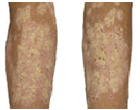 |
Areas typically | Psoriasis on back | Psoriasis on legs |
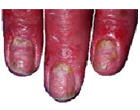 | 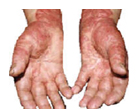 | 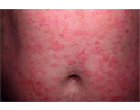 |
Psoriasis under finger nails | Psoriasis on hands | Psoriasis on stomach |
Hair loss laser hair therapy
We proudly offer the most powerful home Low Level Laser Therapy (LLLT) device for Hair Loss available. Our unique design offers more laser power per laser beam than any other laser product. The Dermaray LAS100, Hair Loss Laser is the latest generation Low Level Laser Therapy (LLLT) device designed specifically for advanced hair loss treatment in the privacy of your own home. The Dermaray Laser is the most powerful home hair loss laser treatment available today. Along with the unquie safety features of the Dermaray product. It has the highest targeted laser power output than any other product on the market. Microprocessor controlled, auto self test at power on, musical alarms and constant electronic monitoring performs an in depth system analysis each and during each use. An inbuilt timer automatically and conveniently shuts off the unit after each treatment, making it safer to use. An easy to read backlit LCD display keeps you fully informed of your session time and will alert you to any potential problems.
Now with unique 100mW configuration and 5 powerful 20mW individual laser modules digitally scattered, no plastic mirrors or plastic fibre optics. Up to 100x more powerful than some brands, and 4-20x more powerful than most. More lasers and more real direct laser power per beam than any other brand. Ever wondered why some brands, even ones claiming to be the best, give no technical specifications, but lots of fancy marketing claims?
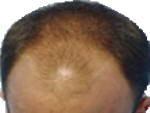 | 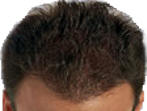 |
picture before | picture after |
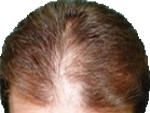 |  |
picture before | picture after |
Acne
Acne is a chronic disorder caused by excess production of oil from sebaceous glands causing of the hair follicles to become plugged. Pimples, black heads, white heads, cysts and sometimes scarring can result.
Acne usually appears around puberty but may also start in adulthood. About 85% of teenagers develop Acne, 15% of which may be moderate to severe. Acne is not infectious and the exact cause is not known but there are many treatments which are effective, but Acne is slow to respond or returns after treatment is stopped. Antibiotics are commonly prescribed to treat the resulting acne infections and pimples, often reducing the patients own immune system.
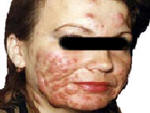 | 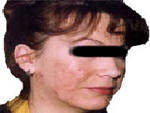 |
acne before | acne after |
for more info contact with us-http://www.clinicdermatech.com
No comments:
Post a Comment